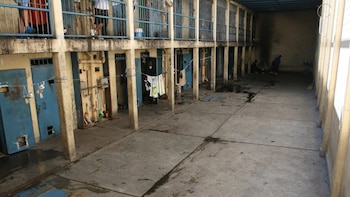
The less said about Lamine Diack the better seems to be the reaction to his death on Dec. 2 in Senegal age 88.
Once celebrated as the first African to lead a major sports federation, Diack is now remembered for leaving the International Association of Athletics Federations, today’s World Athletics, in shambles, convicted of bribery and other charges involving two Olympic bids and the giant Russian doping scandal.
Diack was convicted in a French court earlier this year on the charges, a trial that lasted four years. The legal proceedings were like a whirlpool, drawing in former IOC colleagues with consequence. The French investigation led to one in Brazil, where former Rio 2016 President and IOC member Carlos Nuzman was convicted last month of paying bribes funneled through Diack and his son to secure IOC votes in 2009 for the Rio 2016 bid. Nuzman seems to be headed to prison, pending appeals.
In Diack’s final year as an IOC member in 2013 he is believed to have been part of another scheme to extort cash from the 2020 Tokyo Olympic bid. The scandal savaged the reputation of Japanese Olympic Committee president and IOC member Tsunekazu Takeda. He escaped criminal charges but resigned all his Olympic posts, leaving him an outcast from the Games he helped bring to Tokyo.
Frank Fredericks was the only other IOC member to suffer a fall from grace over the Diack scandal, but others apparently came close to being sucked-in to the scandal, too. But names were never publicly disclosed nor charges made.
All of this took place it should be noted just a decade past the vote-buying scandal of the 2002 Winter Olympics in Salt Lake City. Diack became an IOC member in 2001, one of the first members to join under reforms meant to end bid city vote buying.
So far, the IOC has issued no comment on the death of Diack, avoiding his awkward legacy. When he left the IOC in 2013, his colleagues were oblivious and conferred him with the status of an honorary member, that vote coming three days after Tokyo was chosen for 2020, the voting possibly rigged by Diack.
Unfortunate as may be the circumstances of Diack’s bid corruption, it is believed that it might be the last of its kind. New IOC rules adopted in the aftermath of the Diack scandal now minimize the influence of vote peddling by members.
But far bigger than IOC vote-buying, in 2014 Diack became a central figure in the allegations of massive doping fraud involving Russian athletes. What began as a whistleblower alert about doping test manipulation and fraud at the Sochi Olympics spread to athletics and other sports. According to last month’s verdict of the French court, Diack extorted $1 million in bribes from Russian athletes to keep quiet about positive drug tests. The treasurer of the Russian Athletics Federation was convicted with Diack.
The Russian scandal has led to a suspension of the RAF for the past six years by World Athletics, an unprecedented length. The IOC has yet to lift its embargo on recognition of Russia at the Olympics, in effect since 2016.
World Athletics says Russia is making progress towards a return to full recognition. Paris 2024 may be the Olympics where both WA and the IOC might fully lift the yoke from Russia.
The legacy wrought by Diack’s doping deal-making remains in place years later.
For WA, the Diack saga has been an ordeal. The cost of inquiries and related business is one thing. But the blow to the integrity of sport has been the most difficult wound for WA to heal. Sebastian Coe, Diack’s successor at the federation in 2015, has worked hard to steer things in a new direction without denigrating his predecessor.
The strategy continues even with the death of Lamine Diack.
“Following confirmation from the Confederation of African Athletics, we note the death of Lamine Diack, President of the IAAF from 1999 to 2015″ is the pithy recognition posted today on the World Athletics website.

Diack went to his death this week professing his innocence. An appeal was to be heard in 2022. Just as he escaped punishment from the IOC and the federation he once led, Diack will avoid two years in prison, thanks to his mortality.
And as the writing of this column comes to a close a few hours after it started, there still are no condolences requested from former colleagues of Lamine Diack. The less said, the better.
KEEP READING:
Últimas Noticias
Sinner-Alcaraz, the duel that came to succeed the three phenomenons
Beyond the final result, Roland Garros left the feeling that the Italian and the Spaniard will shape the great duel that came to help us through the duel for the end of the Federer-Nadal-Djokovic era.
Table tennis: Brazil’s Bruna Costa Alexandre will be Olympic and Paralympic in Paris 2024
She is the third in her sport and the seventh athlete to achieve it in the same edition; in Santiago 2023 she was the first athlete with disabilities to compete at the Pan American level and won a medal.

Rugby 7s: the best player of 2023 would only play the medal match in Paris
Argentinian Rodrigo Isgró received a five-game suspension for an indiscipline in the circuit’s decisive clash that would exclude him until the final or the bronze match; the Federation will seek to make the appeal successful.

Rhonex Kipruto, owner of the world record for the 10000 meters on the road, was suspended for six years
The Kenyan received the maximum sanction for irregularities in his biological passport and the Court considered that he was part of a system of “deliberate and sophisticated doping” to improve his performance. He will lose his record and the bronze medal at the Doha World Cup.

Katie Ledecky spoke about doping Chinese swimmers: “It’s difficult to go to Paris knowing that we’re going to compete with some of these athletes”
The American, a seven-time Olympic champion, referred to the case of the 23 positive controls before the Tokyo Games that were announced a few weeks ago and shook the swimming world. “I think our faith in some of the systems is at an all-time low,” he said.





